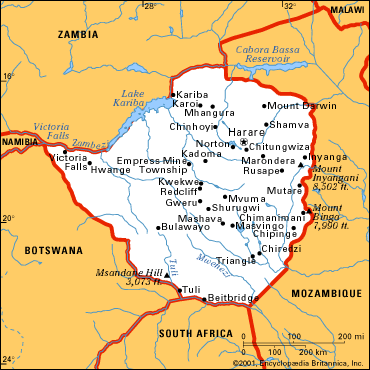Democrat June 2000 (Number 44)
Euro-empires back into Africa
Leo Dreapir explains the latest moves of imperialism
"The British media wants me to give the order to end
the occupations, but I will not do it. This is a revolution, it has
nothing to do with infringements of the law." - President Mugabe

The deaths of three farmers has unleashed gushing
Western demonisation of Zimbabwe's President and the war veterans
movement. Thousands of hungry landless African peasants in their own
country demanding a piece of their own land are effortlessly dismissed.
British colonists occupied African agricultural land
in the early 1900's by British armed force. In the 1960's those colonial
settlers declared unilateral independence from Britain and governed
by apartheid.
During the liberation British colonists, and their
Anglo-US backers killed 25,000 African civilians in bombing and elite
commando raids. President Robert Mugabe led the Patriotic Front during
the liberation .
In December 1980, the Thatcher - Reagan alliance,
forced the "Lancaster House Agreement" on the new sovereign Zimbabwe.
The deal, gave the British white minority 20 of the 100 National Assembly
seats, and an assurance they would not be dispossessed until 1990.
The Anglo- Americans were guarantors against expropriation. In 1987
the British minority represented minus 2% of the population
After 1980 the US and British secret services penetrated ZANU-PF, corrupted a section of its leadership and put Zimbabwe's revolutionary
agrarian programme on the back burner. Agrarian reform was adjourned.4,000
British families still control 30% of prime land in a country half
as big again as Great Britain.
An MCD (Movement for Democratic Change), has appeared
opposing military support for the Congolese revolution. Relying on
the black urban African middle classes in alliance with the British
farmers they hope to capitalise on peasant and urban social discontent
at IMF "Structural" devastation and dominate a majority of seats at
the next election..
When the government shelved the revolution, it lost
the support of African peasants. The Western media hailed Mugabe the
great African icon of IMF economic reform. In February 2000, Mugabe
sought to regain peasant confidence, in a referendum favouring the
expropriation of British held land without compensation. But following
the MDC campaign amongst the urban middle classes, the "no" vote won
53%.
The Anglo-Americans instantly remodelled, Mugabe a
corrupt and incompetent African leader demanding he resign. The West
estimated Zimbabwe was on the edge of the abyss.
The more the West raged, the more President Mugabe
reinforced his anti-imperialist stand, drawing from the 1970's revolutionary
programme.Essentially, the weakness of the MDC referendum victory
and the strength of the War Veterans Movement is that 80% of Zimbabweans,
the rural peasants,did not take part in the vote. The MDC is nationally
weak and receives a constant build up from US and British support..
In 1998, the Anglo-US backed Rwanda Uganda alliance attacked the Congo,
Mugabe stood squarely with Angola, Namibia and Mozambique, in the
camp of the Congo revolution. The Anglo-Americans found themselves
facing strategic defeat.
The proxy war against the Congo aimed to establish
a puppet government to continue pillaging the fabulous Congo riches
on behalf of Anglo-American interests. The political struggle in Zimbabwe
cannot be properly understood outside the Central African revolution.
African leaders, that came to the aid of the Congolese
revolution, were concerned that Anglo-American proxy wars would destabilise
the entire continent. Since then President Mugabe has been under heavy
sustained pressure from the West to withdraw 10,000 Zimbabwe troops
from the Congo.
The IMF demands Zimbabwe's immediate withdrawal from
the Congo. The Financial Gazette 18.3. 99, reported IMF strategy was
not to provide any more aid to Zimbabwe, but negotiate that aid in
exchange for pressure on President Kabila. IMF demanded that President
Mugabe pressurise the Congolese President to negotiate directly with
the US and Ugandan backed rebels. Mugabe insists Zimbabwe will not
withdraw from the Congo until the Ugandan and Rwandan aggressors withdraw,
and are replaced by the UN.
London and Washington see Sierra Leone as the weak
link in the African revolution intervening because the UN/ African
force lacked the will to contain the anti-Western rebels satisfactorily
thus opening the door for future direct Western interventions.
The Foreign Office announced they are ready to evacuate
20,000 British colonials from Zimbabwe. In the light of the British
Sierra Leone operation this can only be read as a veiled threat of
military intervention against President Mugabe's government.
Beware, Messers Cook and Hain! Landless peasants
throughout the Third World rejoice in solidarity with the Zimbabwean
struggle.